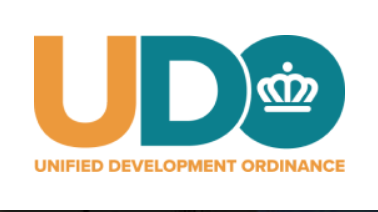Sustain Charlotte urges City Council to proceed with the approved UDO

Charlotte City Council met for its monthly zoning meeting on Monday night, hearing feedback from residents on a number of zoning petitions regarding new residential communities developers want to build in northeast and southwest Charlotte. We are concerned about council members’ comments about delaying the implementation of the Unified Development Ordinance (UDO), which was approved last year and is set to take effect on June 1, and overturning the duplex/triplex policy. (Read a refresher on the UDO and why it matters.)
On Tuesday, Sustain Charlotte sent the following letter to all City Council members.
Dear Council Members and Mayor Lyles,
During last night’s zoning meeting, some of you expressed concerns about implementing the UDO on June 1 as scheduled. As residents share with you their concerns about traffic, crime, displacement, increased code enforcement, and changing neighborhood character, it’s important to focus on what the UDO is designed to do. It’s the primary implementation tool to achieve the long-term vision for equitable growth and development across Charlotte.
Without this tool to implement the 2040 Comprehensive Plan, we would continue our current approach to land development that perpetuates car-dependent sprawl, concentrates low-quality development in Crescent neighborhoods, restricts housing supply, and further diminishes the safety of our air and water.
The UDO requires more green space in developments, includes new measures to protect our tree canopy, and more infrastructure, among many other community benefits.
Policy 2.1 in the 2040 Comprehensive Plan will allow duplexes and triplexes to be built on any lot currently zoned for single-family only, except for areas where an HOA or covenants disallow this. This policy is an essential part of the plan because it will allow more “missing middle” housing within neighborhoods. And increasing the housing supply is critical to addressing our housing affordability problem. When we restrict housing, we reduce the supply, increasing the price.
We share concerns about displacement and encourage you to adopt and implement anti-displacement strategies recommended by the Neighborhood Equity and Stabilization (NEST) Commission as soon as they are ready.
We also agree with concerns raised about ensuring our infrastructure grows alongside increased housing. As our city grows, we absolutely need to build the infrastructure needed to support more housing, including sewer and water, sidewalks, bike paths, parks, schools, and public transit. For this reason, we have been a steadfast voice for the one-cent sales tax for mobility. Importantly though, the UDO will also require more infrastructure investment from developers than our current ordinance.
In short, we urge you not to throw the baby out with the bathwater by overturning policy 2.1 or delaying the UDO implementation. Every day of delay means more opportunities for by-right development that is out of alignment with Charlotte’s adopted growth plans. And it means more of the status quo that isn’t working for our residents.
Planning staff, previous and current Council Members, and thousands of residents have worked hard over the past several years to create and adopt a Comprehensive Plan and UDO to help us grow more equitably, sustainably, and with a higher development standard.
I welcome the opportunity to meet with you personally to discuss your concerns.
Thank you for your service,
Shannon Binns
Executive Director, Sustain Charlotte
- Watch a replay of this week’s City Council meeting here.
- Read a refresher on the UDO and why it matters.
Thanks for reading!
As a nonprofit, community support is essential for us to keep doing what we do — including providing free articles like this. If you found this article helpful, please consider supporting Sustain Charlotte so we can continue advocating for a better future and working with residents, neighborhood organizations, government agencies, nonprofits, and businesses to solve the most critical challenges to Charlotte’s long-term social, economic, and environmental health.
Want to stay in the loop? Subscribe to our weekly newsletter and follow us on Twitter, Facebook, and Instagram
